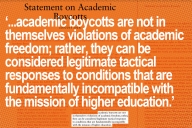You have /5 articles left.
Sign up for a free account or log in.

David Legates
U. of Delaware
The University of Delaware is refusing to fulfill a congressman's request that it release information about who is funding a prominent climate change skeptic’s research. The university is the first of seven institutions facing similar requests to publicly deny them, citing concerns about academic freedom. Delaware’s refusal raises important questions about the line between protecting free inquiry and preserving research integrity, and signals a reversal of sorts from an earlier position on controversial research funding. And not everyone agrees that academic freedom covers a decision to keep funding sources secret.
Last month, Representative Raul Grijalva of Arizona, ranking Democrat on the House Committee on Natural Resources, sent a letter to Delaware, expressing concerns about the ongoing work of David Legates, a professor of climatology there. Legates specializes in statistical methods, specifically related to precipitation, and has been a vocal critic of the general scientific consensus that climate change is a result of humans. He’s also alleged -- including in Congressional testimony -- that climate change science “dissenters” are systematically “silenced” by threats to their careers.
Grijalva wrote that he was concerned Legates might have the same conflict of interest as Wei-Hock Soon, a researcher for the Harvard-Smithsonian Center for Astrophysics and superstar among climate change skeptics -- at least until recently, when he was the subject of an exposé in The New York Times. The piece was based on a series of documents obtained by Greenpeace through open records requests, and alleged that Soon had received some $1.2 million from fossil fuel giants ExxonMobil, Southern Company and American Petroleum Institute, along with the Charles G. Koch Charitable Foundation -- but failed to declare that potential conflict in at least 11 journal articles since 2008. (Soon did not respond to questions but has long stated that his funding has no influence on his findings, according to The Times.)
“If true, these may not be isolated incidents,” Grijalva wrote to Delaware, noting that Legates presented at a 2009 conference organized by the Heartland Institute, which is funded in part by the Koch Foundation, which has backed politicians who deny climate change. Legates also has co-authored several articles with Soon. “I am hopeful that a few key pieces of information will establish the impartiality of climate research and policy recommendations published in your institution’s name and assist me and my colleagues in making better law,” Grijalva said.
He added, “Companies with a direct financial interest in climate and air quality standards are funding environmental research that influences state and federal regulations and shapes public understanding of climate science. These conflicts should be clear to stakeholders, including policy makers who use scientific information to make decisions.”
Grijalva requested specific information from Patrick T. Harker, Delaware’s president, including all university policies on financial disclosure and conflict of interest, copies of and written communication about Legates’s Congressional testimony, and the professor’s total annual compensation from 2007 to 2015.
The congressman also requested a detailed accounting of Legates’s sources of external funding, including consulting fees, “promotional considerations,” speaking fees, travel expenses and other compensation than his Delaware salary. For each item, Grijalva requested the source, amount, “reason” for receiving the funding, any and all communication about it, and, for grants, a description of the research proposal and copy of the funded grant.
Last week, on Grijalva’s deadline, Harker and Domenico Grasso, Delaware’s provost, responded by saying that the institution “responsibly polices and manages potential conflicts of interest” associated with faculty research. They also shared Delaware’s various disclosure guidelines, including the Conflict of Interest Policy and Procedures for Faculty and Professional Staff. The policy requires that faculty members “conduct their professional and personal duties with maximum integrity, and [avoid] association with any activities that could diminish or could be perceived as diminishing the effectiveness of their commitment to the university.” Under the policy, professors must report “significant financial interests” by completing annual written disclosure reports to their supervisors.
As for Grijalva’s other questions about Legates specifically, Harker and Grasso declined to answer, saying the requests “intrude into areas that are protected by academic freedom.” They attached the Faculty Handbook’s statement on academic freedom, which says that if faculty members are “to teach and carry on research effectively, academic freedom is necessary.”
The statement continues, “Academic freedom is the freedom of the faculty to teach and speak out as the fruits of their research and scholarship dictate, even though their conclusions may be unpopular or contrary to public opinion.”
Harker and Grasso note that the collective bargaining agreement with the university’s American Association of University Professors-affiliated union includes a similar statement, and that Delaware “chooses not to act in a manner inconsistent with its governing principles and contractual commitments.”
It's unclear how many, if any, other institutions on Grijalva’s list of seven -- available here -- have responded similarly on behalf of their professors involved in climate change research. Adam Sarvana, a spokesman for the House natural resources committee, said the Congressional investigation is ongoing and for that reason, “we’re not discussing what we’ve found or from where just yet.”
Delaware’s response is significant on its own because it so strongly affirmed the professor’s right to privacy regarding his funding sources, and because the move represents something of a departure from a previous stance on academic freedom and research funding. (Although Delaware did decline to hand over similar information to Greenpeace in the aftermath of 2009's so-called ClimateGate scandal, in which hackers released emails from climate researchers who supported the man-made position, according to Legates's testimony.)
In the early 1990s, Delaware blocked controversial funding for two professors’ work on the possible relationship between race and intelligence. The university initially said that the educational studies’ professors’ acceptance of research dollars from the Pioneer Fund -- whose charter supported eugenics and which many critics said promoted racist research goals -- was not appropriate.
A little more than two years later, the university settled a labor grievance with the two professors, allowing them to continue their research backed by the Pioneer Fund. The A.A.U.P. supported the professors at the time, arguing that the university incursion into their research agenda violated their academic freedom.
Of course, there are differences between the two cases -- namely that the Pioneer Fund was disclosed as a source of funding up front. The president of Delaware’s A.A.U.P. chapter could not immediately be reached for comment, but Greg Scholtz, director of academic freedom and governance for the national office, referred questions to the organization’s Recommended Principles to Guide Academy-Industry Relationships.
The document says, in part, that no “contract should restrict faculty, students, postdoctoral fellows or academic professionals from freely disclosing their funding source. A signed copy of all final legal research contracts and [memorandums of understanding] formalizing the [contract] and any other types of sponsored agreements formed on campus... should be made freely available to the public -- with discrete redactions only to protect valid commercial trade secrets, but not for other reasons.”
Legates did not respond to requests for comment.
Cary Nelson, professor of English at the University of Illinois at Urbana-Champaign and author of the A.A.U.P.'s academy-industry relationships guide, said via email that "A.A.U.P. makes it clear that full disclosure of all research funding sources is essential for research integrity and the maintenance of public trust. We urge that all funding be fully and automatically disclosed on publicly accessible websites.”
He added, "A refusal to disclose funding triggers concerns that there is something to hide, most ordinarily that the funders have an interest in seeing certain outcomes, as opposed to disinterested results."









